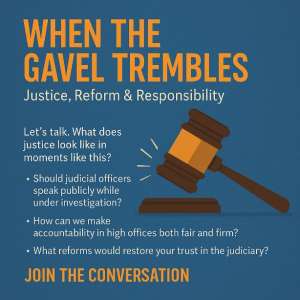
In every democracy, there are moments that test not just the strength of institutions, but the character of those who lead them. Ghana now finds itself in such a moment. The suspension of Chief Justice Gertrude Araba Esaaba Torkornoo is not merely a procedural event—it is a constitutional crucible, a test of our collective commitment to the rule of law, and a mirror reflecting the fragility of public trust in our justice system.
The suspended Chief Justice’s decision to publicly challenge the process of her suspension—describing it as “unfair,” “opaque,” and politically motivated—has ignited a national debate. Her press conference, held in defiance of convention and judicial decorum, was a bold move. But boldness is not always wisdom. As Justice Felix Frankfurter once cautioned, “The ultimate touchstone of constitutionality is the Constitution itself—not what we have said about it.”
The Office, Not the Occupant
Let us be clear: the suspended Chief Justice is entitled to a fair hearing. But fairness is not forged in the fires of public sentiment—it is secured through the quiet, deliberate mechanisms of due process. By choosing to litigate her grievances in the court of public opinion, she risks transforming a constitutional process into a political spectacle. And in doing so, she places the dignity of the judiciary on a precarious ledge.
This is not a moment for rebellion. It is a moment for reform. The suspended Chief Justice’s actions, however well-intentioned, must not eclipse the higher duty she owes to the institution she leads. As the late Justice Ruth Bader Ginsburg once said, “Reacting in anger or annoyance will not advance one’s ability to persuade.” Judicial temperament demands restraint, not retaliation.
A Judiciary Under Scrutiny
The implications of this crisis extend far beyond one individual. Ghana’s judiciary has long been perceived as one of the last bastions of democratic accountability. Yet recent governance indices paint a troubling picture: a steady decline in public trust, concerns over political interference, and a judiciary increasingly seen as vulnerable to executive overreach.
The opacity of the investigative process—held partially in-camera—has drawn criticism. But discretion in such proceedings is not inherently sinister. It may, in fact, be necessary to protect the integrity of the process and shield the judiciary from further reputational harm. Still, the lack of clear communication has left a vacuum, one that has been filled with speculation, partisanship, and cynicism.
Reform or Ruin?
This moment must not be wasted. It is a clarion call for structural reform. Ghana must urgently revisit the mechanisms for judicial accountability—ensuring they are transparent, independent, and insulated from political manipulation. The disciplinary process for judges, especially at the highest levels, must be robust enough to command public confidence, yet fair enough to protect against abuse.
Moreover, the appointment and removal of Chief Justices must be de-politicized. If the judiciary is to remain a neutral arbiter, it cannot be seen as an extension of the ruling party or the opposition. The next appointee—whether interim or permanent—must be demonstrably independent, ethically grounded, and committed to restoring the moral authority of the bench.
A Word of Caution
To the suspended Chief Justice: this is not the time to stoke public outrage. It is the time to submit to the very Constitution you once swore to uphold. “The robe does not shield one from the rule of law; rather, it binds one more deeply to it.” Your legacy will not be defined by the allegations you face, but by how you respond to them. Silence, in this case, is not weakness—it is strength. It is the quiet courage of one who believes that justice, though slow, is sure.
The Nation Watches
Ghana stands at a crossroads. The gavel trembles—not because it is weak, but because the hand that holds it is being tested. Will we allow this moment to descend into partisan chaos, or will we rise to the occasion and reaffirm our commitment to constitutionalism, accountability, and institutional integrity?
The answer lies not in the headlines, but in our collective resolve. Let us choose reform over rebellion. Let us choose principle over personality. And above all, let us remember: the law is the law—and no one, not even its highest custodian, is above it.
Retired Senior Citizen
Teshie-Nungua
[email protected]


